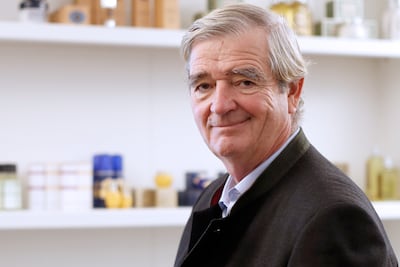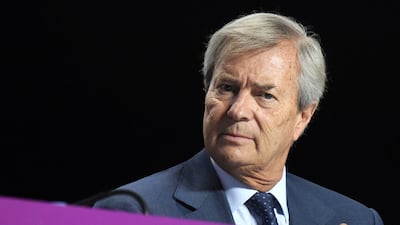Billionaire Vincent Bollore’s eponymous holding company is considering building an electric car battery factory in eastern France, a costly venture that comes amid a deep overhaul of the media and industry tycoon’s empire.
The Paris-listed Bollore, which is controlled by the 72-year-old businessman, is “actively working” on developing the plant with a goal of opening around 2030, a company spokesman said, confirming a report in Les Echos newspaper that also said the government may provide about €500 million ($534 million) in subsidies.
The plan could cost roughly €2 billion and would depend on conditions such as financing, technology and demand, the spokesman said.
Battery plants are key to European efforts to set up a local electric vehicle supply chain to rival Asia’s dominance.
Car makers in the region have been trying to secure long-term supplies as they retool their factories to make EVs.
Bollore’s Blue Solutions unit is spearheading the project as part of its work on developing solid-state lithium metal polymer batteries.
The company is headed by Mr Bollore’s son, Cyrille, 38, and has a range of operations including oil distribution, vineyards, media and publishing.
The company also has stakes in Universal Music Group and the conglomerate Vivendi, whose chairman is another son, 44-year-old Yannick.
Mr Bollore’s net worth is about $9.2 billion, according to the Bloomberg Billionaires Index. He announced his retirement in 2022 but has remained active in the business.

Chip Wilson
Lululemon Athletica founder Chip Wilson pledged a chunk of his multibillion-dollar stake in the yogawear maker to secure financing from Goldman Sachs Group, leveraging his biggest listed asset.
An investment company for the Canadian billionaire pledged 1.8 million Lululemon shares – almost 20 per cent of his holding – recently as collateral for a $200 million margin loan facility from the US bank, according to a regulatory filing.
The stake is valued at about $660 million. Lululemon stock has slumped 25 per cent since late March, when it reported a slowdown in its US business and offered a disappointing sales outlook.
Mr Wilson has a net worth of $6.8 billion, according to the Bloomberg Billionaires Index.
The transaction offers a glimpse at how the rich can leverage their public holdings for huge sums of liquidity and comes as Mr Wilson, who stepped back from day-to-day management of Lululemon more than a decade ago, expands his investments outside the company.
The 69-year-old boosted his stake in Amer Sports earlier this year through the US initial public offering of the maker for Wilson tennis rackets.
He also has a real estate company, Low Tide Properties, which owns more than two dozen buildings in Vancouver, and is spending $100 million to find a cure for his rare form of muscular dystrophy.
Pledging shares is relatively common among the ultra-rich. Elon Musk has used Tesla stock to obtain personal loans, while IWG chief executive Mark Dixon pledged almost all his holding in the world’s biggest operator of serviced offices as collateral for Deutsche Bank financing.
Mr Wilson founded the Vancouver-based Lululemon in 1998. He exited as chairman in 2013 after a manufacturing defect resulted in transparent yoga pants, and Mr Wilson stirred up controversy by saying “some women’s bodies just don’t work” for the company’s products.
He left the board two years later after clashing with the company’s leadership over strategy.
He sold about half his stake in Lululemon a decade ago but still controls a roughly 8 per cent holding worth almost $4 billion, his biggest individual asset, according to Bloomberg’s wealth index.

Reinold Geiger
Reinold Geiger, the billionaire owner of L’Occitane International, wants to take the skincare company private in a move that could end its 14-year run on the Hong Kong stock exchange.
The Austrian is offering HK$34 ($4.30) a share for the L’Occitane shares he doesn’t already own, according to a statement.
This represents a premium of 61 per cent to the 60-day undisturbed share price of the luxury retailer of French-themed body, face, hair, fragrance and home products.
The deal values L’Occitane at €6 billion on an equity basis and has already received backing from many shareholders.
Mr Geiger, who became a shareholder in L’Occitane about 30 years ago and is now its chairman, will fund the buyout with financing from Blackstone’s tactical opportunities fund and Goldman Sachs Group’s asset management arm.
External debt will also be provided by Credit Agricole Corporate and Investment Bank.
L’Occitane was founded in 1976 by the Frenchman Olivier Baussan, who started out making essential oils from plants like lavender in the Provence countryside and selling them at local markets.

Mr Geiger became a minority shareholder in 1994 but has said the company’s poor performance prompted him to start working there to safeguard his investment.
The retailer was listed in Hong Kong in a 2010 IPO and now has eight brands and some 3,000 locations in 90 countries. Its fastest growing region is the Americas.
Mr Geiger already controls more than 70 per cent of the company through a vehicle, exchange filings show.
L’Occitane, which has its headquarters in Luxembourg and Geneva, said delisting will allow the current management team greater flexibility to invest in long-term sustainable growth initiatives and pursue strategic investments.
The company said that greater flexibility, free of the pressures of capital markets’ expectations, is particularly important now given the intensifying competition in the global skincare and cosmetics industry.
Trading of L’Occitane was suspended in Hong Kong on April 9, pending an announcement related to takeover codes.

Elon Musk
Elon Musk was in dire need of a quick win for Tesla. If that meant flying to China a week after standing up Indian Prime Minister Narendra Modi, then so be it.
The billionaire’s surprise trip to Beijing on April 28 for meetings with officials, including Premier Li Qiang, paid immediate dividends.
Tesla secured tentative approval to deploy its more advanced driver-assistance features in China, potentially boosting revenue in its second-most important market.
Tesla’s China business could use the lift – the company has repeatedly cut prices over the last 18 months to levels that may have completely wiped out earnings from the country.
Mr Musk’s visit was in some ways a return to a safe haven.
Tesla holds a unique position among China’s most-favoured foreign companies. It was the first international car maker to operate without having to form a joint venture with a local manufacturer – an exception not granted to the likes of Volkswagen or General Motors.
That red-carpet treatment contrasts with Tesla’s long-standing impasse with India, whose trade and tax policies have been unwelcoming to foreign car makers.
Mr Musk said in 2022 that Tesla wouldn’t set up manufacturing plants in countries where the company isn’t allowed to first sell and service vehicles.
Tesla’s ties to India showed signs of strengthening in recent months, with expectations building that the company may commit about $2 billion to an EV plant, and the government lowering import taxes on vehicles from foreign car makers that pledge to invest in local manufacturing.
But any such announcement has been put off. Mr Musk scrapped his visit to India a day before he was supposed to arrive.
Ultimately, Mr Musk’s decision to visit China underscores the sense of urgency to get Tesla back on track.
EVs make up only a fraction of India’s car market. In China, approval for the system Tesla markets as full self-driving may help the company claw back some of the market share it has lost to domestic manufacturers led by BYD.
“China is the linchpin to anything Tesla wants to do. China is a must-have market in terms of vehicle sales, and India is a nice-to-have,” said Tu Le, the managing director of consultancy Sino Auto Insights.
“Bottom line: Tesla cannot achieve any of its ambitious future goals without continuing to be successful in China.”

